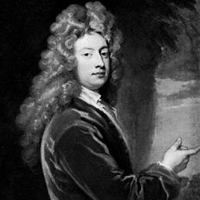William Congreve - Biography and Works
William Congreve (1670-1729) was born at Bardsey, Yorkshire as the son of an army officer. He is one of the best English poet and playwright of the Restoration period in the 17th and 18th centuries. He had the wit and charm of the heroes of his plays and was universally revered by people of all ages.

William Congreve (1670-1729)
The family of Congreve moved to Ireland and spent his fabulous childhood in Ireland during the reign of Charles II. Congreve was educated at Kikenny school, where he met another great satirist Jonathan Swift. They remained friends for the rest of their life. In the Middle Temple in London, he studied law, but found himself more inclined to literature, drama, and the fashionable life.
William Congreve contributed most popular plays for the Restoration period. By the age of thirty, he had authored total four comedies with Love for Love (1695) and The Way of the World (1700), and one tragedy, The Mourning Bride (1697). Congreve's first play, The Old Bachelor (1693) was a massive success when it was staged at the Theatre Royal, Drury Lane. Dryden inscribed that he had never read so brilliant first play.
The Double-Dealer (1693) rotates around a character who deceives everyone with the simple device of telling the plain truth. Most of the modern critics take The Double-Dealer as an improvement over Congreve's first play, however, it was ridiculed by critics and audiences alike at the time of production. Love for Love (1695) brought Congreve a temporary success and love from the public and his reputation improved still further with the production of his only tragedy, The Mourning Bride, in 1697.
The Way of the World (1700) was casually received when it was first acted at Lincoln's Inn Fields, but later on it was considered to be one of the most intellectually accomplished of English comedies. The story is about a pair of lovers, Millamant and Mirabell, who establish a rather unconventional marriage arrangement based on their knowledge of the way of the world. The way of the world in which they live is inhabited primarily by intriguers, fops, and fools. Unfortunately, Congreve's wit and his characters' sexual freedom and experimentation were at odds with the thinking of certain moralists of the day.
Jeremy Collier a critic directly attacked Congreve in his book A Short View of the Immorality and Profaneness of the English Stage (1698). Collier succeeded in getting public support for his cause with the help of the most accepted neoclassical doctrine that the purpose of drama is to teach and please and then pointing out the disparity between theory and practice. Congreve in response to Collier's accusations wrote Amendments of Mr. Collier's False and Imperfect Citations (1698), but the conservative middle class did not support Congreve and took the side of Collier. It became increasingly difficult to get a play produced unless it conformed to Collier's doctrine. Realizing that his protests were in vain, Congreve gave up playwriting altogether when he was only thirty years of age. He died on January 19, 1729, in a carriage accident and was buried in Westminster Abbey. The Duchess of Marlborough, with whom he was rumored to have been romantically involved, erected a monument over his grave.
